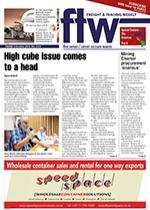A decision by several major shipping lines to introduce a new bunker adjustment factor (BAF) surcharge to offset the cost of the sulphur cap that comes into play in 2020 has attracted widespread industry criticism.
Maersk Line’s announcement was swiftly followed by similar announcements by CMA CGM and MSC. The BAF pricing will become effective next January, a full year ahead of the cap that is aimed at driving down the sulphur content in fuel from 3.5% to 0.5%. The most vocal comment came from Terry Gale, chairman of the Exporters' Club Western Cape, who labelled the news as “most disconcerting”. He indicated that for a country that was already battling to “steer its path through a difficult time”, it put South Africa in an even more precarious position. “We have no say in the implementation of any such surcharge, he said.
Gale added that “in view of the amalgamation of smaller shipping lines into multi conglomerates, there is very little actual competition on any international routings and ultimately every line will follow suit which, of course, is anticompetitive.” In an earlier statement Maersk said given IMO2020, the name adopted for the sulphur cap instituted by the International Maritime Organisation (IMO), it had no option but to consider the cap’s cost implications. “The regulation will bring increases and uncertainty to fuel costs for shipping.”
As a result “the BAF surcharge is designed to recover increases in fuelrelated costs,” the statement said. Maersk furthermore stressed that BAF, which will be replacing its current standard bunker adjustment factor surcharge, would be billed separately from its freight rate. Mike Walwyn, vice chairman of the South African Association of Freight Forwarders (Saaff), pointed out that BAF was nothing new. “It has been a factor for many years, and many of the shipping lines have been charging it all along, though not on every trade route and particularly not on the traffic to and from the Far East, where fierce competition has driven rates down to unprecedented low levels.” SAAFF CEO Dave Logan added that Maersk’s decision was to be expected.
“Any surcharge or other imposed by the shipping lines will inevitably be passed on by our members to their clients, as has happened in the past. Unfortunately consumers end up paying more.” Gale commented that “from a South African context the situation is even more troubling as our local land side charges are also exorbitantly high, in particular when you look at moving containers from our main industrial hub, Gauteng, to the coast for export.”
In respect of the IMO’s motivation, to drastically limit toxic emissions through the introduction of sulphur reductions and related reliance on scrubber technology and the use of liquid natural gas, Gale agreed though that “it must be enforced”.


